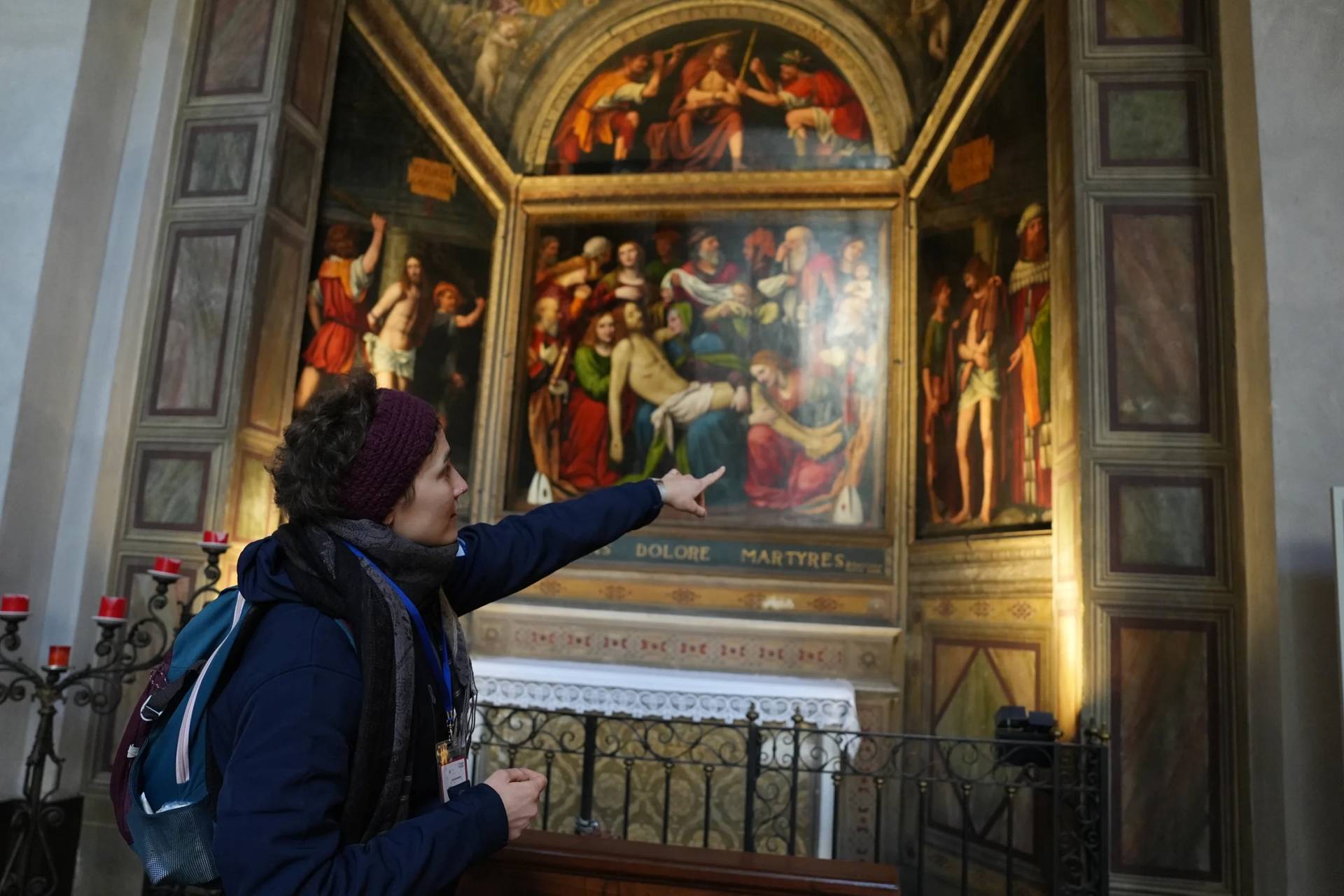ROME – In response to rumors that prominent Jesuit artist Father Marko Ivan Rupnik, accused of abusing several adult women, will be transferred outside of Rome, the Jesuit overseeing the inquiry into his conduct has said the case is still ongoing.
Rumors first appeared in Slovenian news magazine, The Reporter, which quoted the superior of the Jesuits in Slovenia, Father Miran Žvanut, as saying that Rupnik, 68, will soon be transferred out of Rome to a home for aging priests in Milan, and that the Jesuit community Rupnik led, attached to the Centro Aletti that he founded, will be dissolved.
In comments to Crux, Father Johan Verschueren, who in his role as permanent delegate of the Society of Jesus for houses, works and inter-provincial Jesuits in Rome is handling the Rupnik case, said what has been said is not confirmed, but “remains on the record of the Reporter.”
Appearing to hit back at Žvanut’s assertions, Verschueren said that Rupnik “has only one Major Superior, and that is me. Hence, I am treating the case, and I don’t give any comment on the ongoing procedure so far.”
He declined to offer details on the status of the Rupnik inquiry, and he denied the rumor that he will intervene in the Centro Aletti, a community of international artists and theologians, composed of women and men, located in Rome and which for years has served as Rupnik’s base of operations.
Despite the allegations against him, Rupnik’s artwork for months has still been featured prominently on their website along with several YouTube videos of his homilies and artistic ventures.
Verschueren stressed that he is only dealing with Rupnik’s case, “Nothing more, nothing less,” and that because of this, with regard to the rumors about him closing the Jesuit community at the Centro Aletti, “I can deny it.”
He also denied rumors that he would be dismantling the Centro Aletti, a public association of faithful incardinated in the Diocese of Rome, saying, “This is simply impossible,” as the center falls “under the ecclesial authority of the Vicariate of Rome.”
The Diocese of Rome recently quietly launched an Apostolic Visit of the Centro Aletti to gather facts and to determine what sort of internal environment there is in the community. The visitation is ongoing, and no formal information has so far been provided by the Rome diocese.
Rupnik’s case has captivated the Catholic world in recent months, due to his prominent standing as one of the most acclaimed contemporary Catholic artists, as well as the fact that he belongs to the same order as Pope Francis and a slew of other high-ranking Vatican officials.
In the wake of allegations of sexual misconduct with several nuns belonging to a community he helped found in Slovenia, Rupnik was barred by the Jesuits from public ministry and any public artistic activity.
His case made headlines in December when Italian blogs and websites reported that for years, consecrated women had accused him of spiritual and psychological abuse and sexual misconduct. The women belonged to the “Skupnosti Loyola” or Loyola Community, a religious order in Rupnik’s native Slovenia, and their allegations dated back to the 1990s, when Rupnik served there as a spiritual advisor.
After initial reports on the Rupnik allegations began to circulate last year, the Jesuit Order admitted that Rupnik had been briefly excommunicated in 2020 for having committed one of the church’s most serious crimes: using the confessional to absolve a woman with whom he’d had sexual relations.
Rupnik reportedly repented and the excommunication was quickly lifted a month later.
However, a year after that, Rupnik was accused by nine women of sexually, psychologically, and spiritually abusing them at the Loyola Community, which he co-founded, in the 1990s.
At the time, the Jesuits recommended a canonical trial be opened, however the Vatican’s Dicastery for the Doctrine of the Faith (DDF), led by Spanish Jesuit Luis Ladaria, denied the request, refusing to lift the statute of limitations, which has been done in other cases, thus declaring the offenses unable to be prosecuted.
Details on the Rupnik case have remained obscure, and questions have been raised by many as to whether he was protected by the Vatican, where a Jesuit pope reigns and another Jesuit, Spanish Cardinal Luis Ladaria, heads the office where abuse allegations are tried.
As the scandal unfolded last fall, the Jesuits barred Rupnik from public ministry, from making any public comments, and from leaving the Lazio region where Rome is situated.
They invited anyone with other claims to come forward, and as a result, the Jesuits revealed in February that roughly 15 new complaints against Rupnik were made.
At the same time, they announced the new complaints, Verschueren said in a statement that there was not enough to send Rupnik’s case to civil courts, but the Jesuits would continue pursing a meeting with Rupnik, who declined to be interviewed as part of the initial inquiry, and that various disciplinary measures, including defrocking, were on the table as potential punitive measures.
Earlier this month Bishop Jean-Marc Micas of Tarbes and Lourdes, where the famed Marian shrine of Lourdes is located, said he is pondering the removal of several large mosaics designed by Rupnik that adorn the façade of the of the shrine’s main Basilica of the Rosary due to the harm their presence might cause to victims who come to the shrine seeking healing.
The mosaics were commissioned in 2008 for the 150th anniversary of the Marian apparitions in Lourdes, when the Virgin Mary is believed to have appeared to a young woman named Bernadette Soubirous in 1858. Lourdes remains a primary Catholic pilgrimage site associated with physical and spiritual healing.
Follow Elise Ann Allen on Twitter: @eliseannallen














